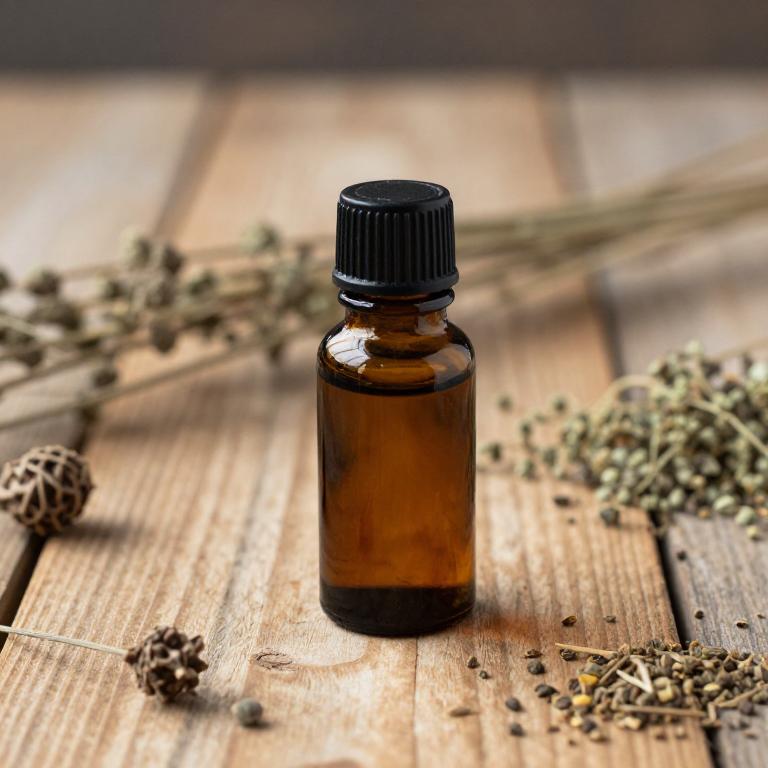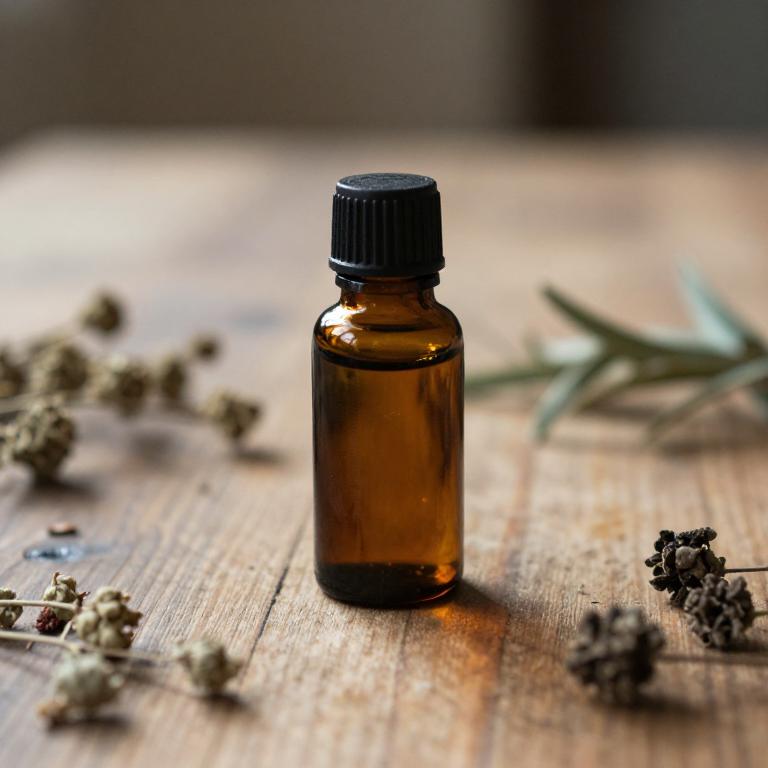10 Best Herbal Essential Oils For Stomach Growling

Herbal essential oils have been traditionally used to address digestive issues such as stomach growling, which is often caused by gas or digestive discomfort.
Oils like ginger, peppermint, and fennel are particularly effective due to their ability to soothe the digestive tract and reduce gas buildup. When diluted properly, these essential oils can be applied topically or inhaled to provide relief from bloating and rumbling sounds in the stomach. They work by calming the muscles of the gastrointestinal system and promoting better digestion.
However, it is important to consult with a healthcare professional before using essential oils, especially for those with existing medical conditions or who are pregnant.
Table of Contents
- 1. Fennel (Foeniculum vulgare)
- 2. Ginger (Zingiber officinale)
- 3. Peppermint (Mentha piperita)
- 4. English lavender (Lavandula angustifolia)
- 5. Black pepper (Piper nigrum)
- 6. Turmeric (Curcuma longa)
- 7. Rosemary (Rosmarinus officinalis)
- 8. Cumin (Cuminum cyminum)
- 9. Thyme (Thymus vulgaris)
- 10. Lemon grass (Cymbopogon citratus)
1. Fennel (Foeniculum vulgare)

Foeniculum vulgare, commonly known as fennel, is a herb widely used in aromatherapy for its digestive benefits, including the relief of stomach growling.
The essential oil of fennel is extracted through steam distillation from the seeds and contains compounds like anethole, which have carminative and antispasmodic properties. When used in aromatherapy, fennel essential oil can help soothe the digestive system and reduce the discomfort of intestinal noises. It is often diffused in a room or applied topically (diluted) to the abdomen for its calming effects.
However, it is important to consult a healthcare professional before use, especially for pregnant women or individuals with existing medical conditions.
2. Ginger (Zingiber officinale)

Zingiber officinale, commonly known as ginger, is widely recognized for its therapeutic properties, particularly in alleviating digestive discomfort.
The essential oils derived from ginger contain potent compounds such as gingerol and shogaol, which possess anti-inflammatory and carminative effects. These oils can help reduce stomach growling by calming the gastrointestinal tract and improving digestion. When used in aromatherapy or diluted in a carrier oil, ginger essential oil may provide relief from bloating and gas.
However, it is important to consult a healthcare professional before use, especially for individuals with existing medical conditions or allergies.
3. Peppermint (Mentha piperita)

Mentha piperita, commonly known as peppermint, is a popular herb used in the production of essential oils that can help alleviate symptoms of stomach growling.
The essential oil of peppermint contains compounds like menthol, which have a calming effect on the gastrointestinal tract and can reduce the sensation of intestinal noises. When used aromatically or topically, peppermint essential oil may help soothe digestive discomfort and promote a sense of relaxation. However, it is important to dilute the oil properly before applying it to the skin to avoid irritation.
Overall, peppermint essential oil is a natural remedy that may support digestive health and reduce the frequency of stomach growling when used appropriately.
4. English lavender (Lavandula angustifolia)

Lavandula angustifolia, commonly known as English lavender, is a popular herb used in the production of essential oils that are valued for their calming and soothing properties.
When used in aromatherapy or topical applications, lavender essential oil may help reduce stress and anxiety, which can indirectly alleviate stomach growling caused by nervousness or digestive upset. While it is not a direct treatment for stomach growling, its anti-inflammatory and digestive properties may support overall gastrointestinal health. Some studies suggest that lavender oil can aid in reducing bloating and promoting digestion, making it a useful complementary therapy for digestive discomfort.
However, it is important to consult with a healthcare professional before using essential oils, especially for persistent or severe stomach issues.
5. Black pepper (Piper nigrum)

Piper nigrum, commonly known as black pepper, contains essential oils that have been traditionally used to support digestive health.
The essential oils in black pepper, particularly those containing compounds like piperine, may help reduce stomach growling by improving gut motility and reducing gas buildup. These oils can stimulate the digestive system, promoting more efficient digestion and reducing the likelihood of excessive gas and noise. However, it is important to use these oils in moderation and consult with a healthcare professional before incorporating them into a treatment regimen.
While some people may find relief from stomach growling using piper nigrum essential oils, they should not replace medical advice or treatment for underlying digestive conditions.
6. Turmeric (Curcuma longa)

Curcuma longa, commonly known as turmeric, is a popular herbal plant whose essential oils have been traditionally used for their anti-inflammatory and digestive benefits.
The essential oils derived from Curcuma longa contain compounds like curcuminoids, which may help reduce gastrointestinal inflammation and support healthy digestion. Some studies suggest that these oils can alleviate symptoms such as stomach growling by improving gut motility and reducing gas buildup. However, it is important to note that while curcuma longa essential oils show promise, they should be used cautiously and under professional guidance due to their potency.
As with any herbal remedy, individual responses can vary, and it is advisable to consult a healthcare provider before incorporating them into a treatment regimen.
7. Rosemary (Rosmarinus officinalis)

Rosmarinus officinalis, commonly known as rosemary, produces essential oils that have been traditionally used to support digestive health.
The essential oil of rosemary contains compounds like cineole and camphor, which may help reduce stomach growling by improving digestion and reducing gas buildup. These oils can be used in aromatherapy or diluted for topical application to soothe the digestive system. However, it is important to consult a healthcare professional before using rosemary essential oil, especially for individuals with existing medical conditions or those who are pregnant.
Overall, rosemary essential oil may offer a natural remedy for occasional stomach growling when used appropriately.
8. Cumin (Cuminum cyminum)

Cuminum cyminum, commonly known as cumin, is a popular herb used in essential oils for its digestive benefits.
The essential oil derived from cumin seeds contains compounds like limonene and cuminaldehyde, which can help soothe digestive discomfort. When used aromatically or topically, cumin essential oil may help reduce stomach growling by improving digestion and reducing gas buildup. It is often recommended for individuals experiencing bloating or indigestion.
However, it should be used with caution and diluted properly to avoid skin irritation.
9. Thyme (Thymus vulgaris)

Thymus vulgaris, commonly known as thyme, is a herb widely used in traditional medicine for its potent essential oils.
The essential oil of thyme contains compounds like thymol and carvacrol, which have antimicrobial and digestive properties. These properties may help alleviate symptoms such as stomach growling by reducing gas and improving digestion. Some studies suggest that thyme essential oil can stimulate digestive enzymes and ease gastrointestinal discomfort.
However, it is important to use thyme essential oil in diluted form and consult a healthcare professional before use, especially for individuals with existing health conditions.
10. Lemon grass (Cymbopogon citratus)

Cymbopogon citratus, commonly known as lemon grass, produces a fragrant essential oil that has been traditionally used for its calming and digestive properties.
This essential oil contains compounds like myrcene and citral, which may help soothe the gastrointestinal tract and reduce symptoms such as stomach growling. When used in aromatherapy or diluted in a carrier oil, it can help alleviate digestive discomfort and promote a sense of relaxation. Some studies suggest that its anti-inflammatory and antispasmodic effects may support healthy digestion.
However, it is important to consult a healthcare professional before using essential oils, especially for individuals with existing medical conditions or during pregnancy.